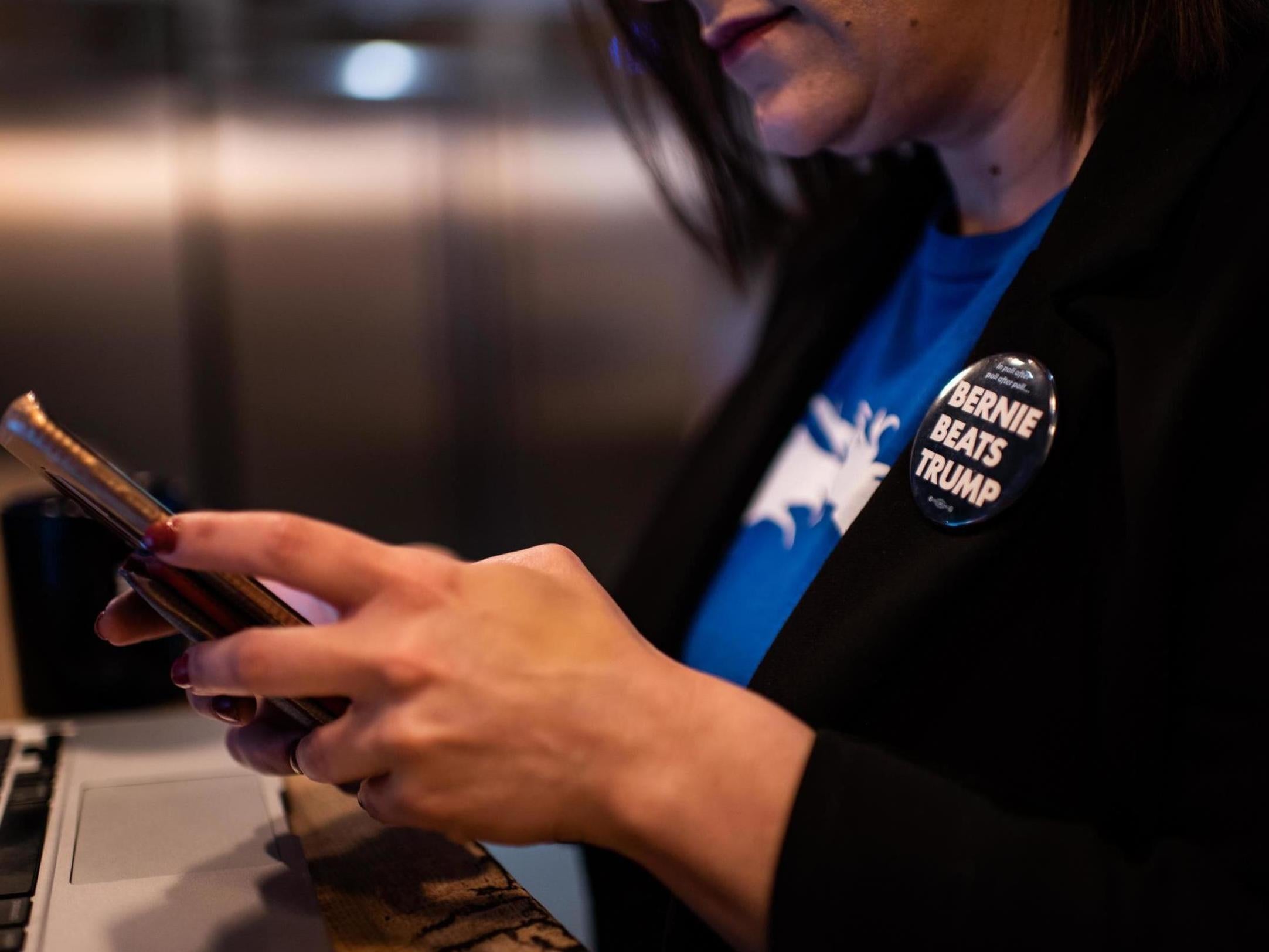US election: Texting emerges as major tool for Bernie Sanders’ campaign
Team boasts more than 12,000 volunteers nationally
Your support helps us to tell the story
From reproductive rights to climate change to Big Tech, The Independent is on the ground when the story is developing. Whether it's investigating the financials of Elon Musk's pro-Trump PAC or producing our latest documentary, 'The A Word', which shines a light on the American women fighting for reproductive rights, we know how important it is to parse out the facts from the messaging.
At such a critical moment in US history, we need reporters on the ground. Your donation allows us to keep sending journalists to speak to both sides of the story.
The Independent is trusted by Americans across the entire political spectrum. And unlike many other quality news outlets, we choose not to lock Americans out of our reporting and analysis with paywalls. We believe quality journalism should be available to everyone, paid for by those who can afford it.
Your support makes all the difference.Some voters think she is a bot when their phones light up with her appeal on behalf of Senator Bernie Sanders. But she is not a bot.
She is Amiebrooke Miller, 40, a boutique manager in Iowa‘s capital, sending texts for the Vermont independent who has been surging in recent polls, thanks in part to the army of plugged-in supporters who plaster his campaign’s message across email inboxes, Facebook feeds and, increasingly, text messages.
They are the digital foot soldiers in this year’s battle for the White House, opting to punch keys on a smartphone instead of trundling through the snow to knock on doors. And they are legion. The Sanders campaign’s text team boasts more than 12,000 volunteers nationally.
In the lead-up to the first-in-the-nation caucuses, the campaign estimates that it has reached nearly a million Iowans via text – almost a third of the state. New software gives each volunteer the power to reach hundreds of Iowans a day, though the response rate varies widely.
When voters learn that there’s a human being behind the bubble of text, said Ms Miller, 40, “they completely change how they talk with us.” She conducts intimate conversations about medical hardship from her home office, a candle lit beside her. Or, she steals 10 minutes from her lunch break to text with voters about college debt.
As phone calls go to voicemail and email solicitations go unanswered, strategists and technology experts expect a turn to text messaging as a mainstay in 2020. That is especially true for campaigns powered by young people, who are more likely to be scrolling on a mobile phone than sitting in front of a television. Text messages are also better for reaching low-income voters who may lack a smartphone, experts say.
“Every other form of voter contact has declined in effectiveness over the last few cycles,” said Betsy Hoover, a Democratic strategist and co-founder of Higher Ground Labs, an incubator for campaign-tech start-ups. “Home addresses are harder and harder to find. People aren’t answering their phones.”
But, Ms Hoover said, “everyone reads their text messages.” The Democratic National Commission’s announcement this week that it was investing six figures in acquiring “tens of millions” of cellphone numbers was an acknowledgement of that fact. The party said it would have “high-quality cellphone numbers” for voters in all 50 states.
Nationally, the Sanders campaign has sent more than 100 million texts, according to a spokesman, Joe Calvello. It has done so using peer-to-peer texting, which allows decentralized agents of a campaign or cause to circulate a common script to scores of people without running afoul of consumer protection rules.
“I work an eight-hour day and then Bernie at night,” said Ms Miller, a mother of two, adopting the verb form coined by her family to describe her volunteer labour for Sanders. “And Bernie on my days off.”
Volunteers send texts seven days a week, from 9am Eastern to 9pm Pacific time. A texter begins by requesting a set of messages – the average size ranging from 500 to 750 messages – and pressing send on each missive. Then they wait for replies.
The sender’s name is preloaded, as is the name of the recipient, though the phone numbers of both are obscured. The request, determined by a preset script, can be anything from a donation to attendance at an event. Members of an advance team work on identifying and persuading undecided voters, and the information they glean is fed back into the campaign’s database.
“Bernie is committed to creating a government and an economy that work for all of us, not just wealthy campaign contributors,” reads the opening appeal to voters whose leanings are unknown. “Are you in for Bernie?”

The team congregates on Slack, an online messaging app, to coordinate work, as well as to offer support and ensure “self-care,” as Ms Miller put it. A mobile app, BERN, will play a more prominent role in larger states that come later in the calendar, as supporters in states such as California and Texas log information about their friends, including level of support and union membership. In Iowa, the campaign has rich enough data to reach likely caucus-goers more directly.
Texting is hardly cutting-edge. The first SMS message was sent almost 30 years ago. And more than a decade ago, Barack Obama’s campaign texted supporters to announce his choice of Joe Biden as his running mate.
What is new, however, is the development of technologies allowing mass distribution by individual volunteers, who are then able to conduct one-on-one conversations with voters who choose to reply. Especially novel is the integration of these technologies into campaign organising infrastructure.
Senator Sanders, whose 2016 campaign was the first to put peer-to-peer texting to use at scale, now employs a text team director, two English-language texting organisers and a Spanish-language texting organiser. The platform his team used in 2016, called Hustle, saw its campaign clientele multiply in two years, and it gave rise to competitors, including Relay. The software, developed by alumni of the Sanders campaign, was used by Alexandria Ocasio-Cortez, Democrat for New York, to deliver 170,000 texts to voters in her successful bid to oust incumbent Joseph Crowley in New York in 2018, according to her campaign’s spokesman, Corbin Trent.
Now, all the top-tier presidential candidates are texting. And Iowa is on their minds. “It’s clear that our post-debate surge has worn off,” a message from Joe Biden’s online fundraising director warned this month. “But, with just 18 days until the Iowa Caucus, we can’t afford to lose any steam!”
On Thursday evening, Bonnie Whitaker, an undecided voter in a suburb of Des Moines, attended a town hall with Pete Buttigieg, the former mayor of South Bend, Indiana. An hour later after she returned home, a text arrived. “Hi Bonnie! How was your experience at Meet Pete in Ankeny!?” it read. “Reply GOOD if it was good, BAD if it was not, or MISSED if you didn’t make it.”
Jason Noble, communications director for Elizabeth Warren’s Iowa campaign, touted the streamlined opportunities for caucus goers to signal their support for the campaign in the final days before the caucuses. Texting IOWA to a short code of five numbers, for example, prompts a voter to commit to caucus for the candidate. For New Hampshire residents craving something a bit different, texting LLAMA to the same set of numbers signs a voter up to the campaign’s Granite State operation, as well as to a dose of four-legged content.
“Campaigns are always trying to get on top of the latest technology,” said Sheena Pakanati, who partnered in 2016 with Saikat Chakrabarti, later chief of staff to Representative Ocasio-Cortez, to develop the platform Spoke, which the Sanders campaign is using this cycle.
The co-founders made the tool open source and handed over ownership in 2017 to MoveOn. The progressive advocacy group touts the platform using the catchphrase “The resistance is mobile.”
“Peer-to-peer, which was already being used for marketing, started to be seen as a viable way of reaching voters as well,” Ms Pakanati said.
And not just by the left. Gary Coby, the digital director for President Donald Trump’s reelection campaign, is also the chief executive of Opn Sesame, a peer-to-peer platform whose advertising materials declare, “Text is going to kill email.” According to Opn Sesame, 90 per cent of text messages are read within five minutes.
In another sign of buy-in from top GOP operatives, the company also counts Gerrit Lansing, president of the online fundraising platform WinRed and former digital director for the Republican National Committee, as a co-founder, though he’s no longer involved in day-to-day operations. The Republican National Committee (RNC) paid Opn Sesame more than $1.5m (£1.1m) last year, according to FEC records.
“Each message transmitted using the Opn Sesame platform must be individually, manually sent from a single sender to a single recipient,” Mr Lansing wrote in a filing last year in federal court in West Virginia, where a complaint arose from a voter who had received a text from a political action committee using Opn Sesame’s software.
The role of the human operator is crucial. It is the basis for a petition before the Federal Communications Committee (FCC) – filed in 2018 by a collection of peer-to-peer companies calling themselves the “P2P Alliance” – asking for clarification that text messages are not subject to “restrictions on calls to mobile phone numbers” spelled out by the Telephone Consumer Protection Act of 1991. The group pointed to a 2016 advisory from the FCC affirming that, “only manually placed text messages are permissible without prior express consent.” The RNC weighed in, urging the agency to “tread lightly when it comes to regulating political speech.” The petition is still pending.
The dispute is of considerable significance to campaigns, which have faced class-action complaints alleging that the new tools allow the text equivalent of illegal robocalls.

Last cycle, the Trump campaign faced a lawsuit from a voter in Illinois, who found this unsolicited message irksome enough to bring suit: “Reply YES to subscribe to Donald J Trump for President. Your subscription will help Make American Great Again! Msg&data rates may apply.”
The claim was ultimately withdrawn, but the plaintiff’s attorney, Joseph Siprut, warned that penalties can be steep for campaigns that misuse mass-texting software.
Some advocates say mass-texting technologies should not be allowed, even those operated by a human volunteer like Ms Miller, rather than a bot.
“Involving a human at some step is not sufficient,” said John Bergmayer, legal director for the Washington-based nonprofit Public Knowledge. “You don’t get to engineer your way out of robo-texting rules.”
The Washington Post

Join our commenting forum
Join thought-provoking conversations, follow other Independent readers and see their replies
Comments